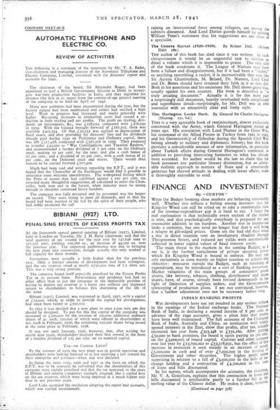COMPANY MEET.NCS
AUTOMATIC TELEPHONE AND ELECTRIC CO.
REVIEW OF ACTIVITIES
THE following is a summary of the statement by Mr. T. A. Eades, vice-chairman and managing director of the Automatic Telephone and Electric Company, Limited, circulated with the directors' report and accounts for 1940.
The chairman of the board, Sir Alexander Roger had been appointed to lead a British Government Mission to Delhi to investi- gate war-time production facilities in India, and they regretted his absence (the first in 21 years) from the coming-of-age general meeting of the company to be held on April 1st 1941.
Many new problems had been encountered during the year, but the factory output had been maintained and orders had reached a high level. Work in progress had increased and stocks generally were higher. Recurring increases in production costs had caused a re- duction in both trading and net profits. The profit on trading, divi- dends on investments, &c., was £238,052, compared with £276,249 in 1939. With the balance brought forward of £167,302, there was available £405,354. Of that £50,333 was applied to depreciation of fixed assets, and after providing for directors' fees and for dividends already paid during 1940 on Preference and Ordinary capital, there was left £317,438, compared with £327,318 in 1939. They proposed to transfer £4o,000 to War Contingencies and Taxation Reserve," and recommended a further dividend of 7 per cent. on the Ordinary stock, making to per cent. for the year, and also a cash bonus of 21 per cent., and a dividend of to per cent, with a cash bonus of 24 per cent., on the Deferred stock and shares. There would then remain to be carried forward £167,422.
Much had been said and written regarding the and it was hoped that the Chancellor of the Exchequer would find it possible to announce some welcome amendments. The widespread feeling which the Press of recent date had exhibited against a too per cent. tax revealed many thoughtful suggestions, all calculated to assist the Chan- cellor, both now and in the future, when industry must be strong enough to shoulder continued heavy burdens.
The company was fully occupied and its personnel was the largest on record. They were trying to meet all demands, and in that the board had been assisted to the full by the spirit of their people, who had nobly answered the call.






























 Previous page
Previous page